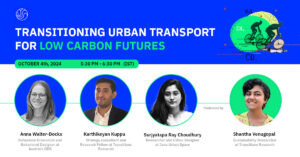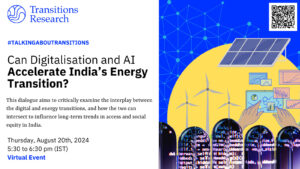Governments and the private sector across the world, and increasingly in the global South, are investing both effort and money to build digital infrastructures to enable the adoption of the ostensible technological panacea that is the “smart city.” Smart cities have the potential to utilize digital infrastructure and data to improve service provision, monitor development and even mitigate carbon emissions. However, ‘good relations’ and frameworks of responsibility and solidarity around the transitions to digital governance and technocratic decision-making need to be better understood. This is especially for cities in the global South which face actue issues of marginalization and data-driven inequities.
Transitions Research organised a panel discussion focusing on how “smart cities” are reshaping relations between public institutions, the private sector and urban residents with the potential to marginalize, silence or disadvantage communities in the face of new political-economic nexuses.




